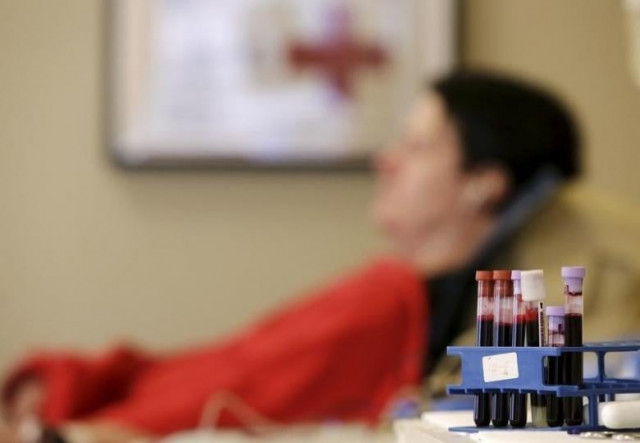Researchers find strong link between high platelets count and cancer
Researchers noted cancer to be more common in those who have the condition for a long time

A man has blood platelets drawn at a hospital. PHOTO: REUTERS
According to a study published in the British Journal of General Practice, an early diagnosis for cancer can be achieved by examining platelet counts – claiming it had the same relevance as a lump did for breast cancer. The scientists believe that using a simple blood test that determined levels of platelet could speed up diagnosis process by up to three months for thousands of patients in a year.
Sarah Bailey, the co-author of the research from the University of Exeter, said “this is a clue which can be used in practice by GPs to help them select patients for further investigation … most excitingly in some patients who may not already have other symptoms of cancer to achieve an earlier diagnosis.”
A doctor’s quest against childhood cancer
The researchers randomly selected almost 50, 000 individuals aged 40 or more, to examine the data for the study – using data of about 31,000 with raised platelet count and nearly 8, 000 without. The team discovered that those who had thrombocytosis were more susceptible to cancer than others: 11. 6 per cent [men] and 6.2 per cent [women]. While 4.1 per cent men and 2.2 per cent women without raised platelet counts were found to have cancer.
“We found cancer was more commonly diagnosed in men with raised platelet counts than it was in women with raised platelet counts and we believe that is because there are more causes of raised platelet counts in women that are not cancer,” said Bailey.
Researchers noted cancer to be more common in those who have the condition for a long time – concluding that 18.1 per cent of men and 10.1 per cent of women developed cancer six months after being diagnosed with raised platelets.
While a link between thrombocytosis and some cancer types has been suspected before by researchers, new guidelines by the National Institute for Health and Care Excellence suggest a high platelet count could be a sign of oesophagal, stomach, lung or uterus cancer. However the relation between thrombocytosis with factors like age and sex are unclear.
This World Cancer Day, let's talk about child patients
A professor of primary care oncology at the University of Leeds, Richard Neal endorsed the study, saying it “demonstrates the potential for a commonly used blood test to identify some patients with cancer earlier.”
“This work should begin to change practice so that GPs should be testing patients with raised platelet counts for cancer, especially those without other potential cancer symptoms,” he added.
On the other, Dr Jasmine Just, health information officer at Cancer Research UK, thinks more research is needed to confirm if tests after thrombocytosis could help save lives. “There are lots of possible reasons a person’s platelet count might be high, and in most cases, it won’t be down to cancer,” she said. “Measuring platelet count in patients who don’t otherwise warrant a blood test is not necessarily a good idea. But if a patient has a blood test for another reason and a high platelet count is found, then one of the possible diagnoses doctors should consider is cancer.”
This article originally appeared on the Guardian.



















COMMENTS
Comments are moderated and generally will be posted if they are on-topic and not abusive.
For more information, please see our Comments FAQ